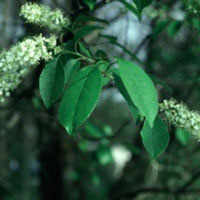Wild Cherry
Uses
Parts Used & Where Grown
Although native to North America, wild cherry trees now grow in many other countries. The bark of the wild cherry tree is used for medicinal preparations.
Our proprietary “Star-Rating” system was developed to help you easily understand the amount of scientific support behind each supplement in relation to a specific health condition. While there is no way to predict whether a vitamin, mineral, or herb will successfully treat or prevent associated health conditions, our unique ratings tell you how well these supplements are understood by the medical community, and whether studies have found them to be effective for other people.
For over a decade, our team has combed through thousands of research articles published in reputable journals. To help you make educated decisions, and to better understand controversial or confusing supplements, our medical experts have digested the science into these three easy-to-follow ratings. We hope this provides you with a helpful resource to make informed decisions towards your health and well-being.
3 StarsReliable and relatively consistent scientific data showing a substantial health benefit.
2 StarsContradictory, insufficient, or preliminary studies suggesting a health benefit or minimal health benefit.
1 StarFor an herb, supported by traditional use but minimal or no scientific evidence. For a supplement, little scientific support.
This supplement has been used in connection with the following health conditions:
| Used for | Why |
|---|---|
1 Star Chronic Obstructive Pulmonary Disease Refer to label instructions | Wild cherry bark is used traditionally to promote mucus discharge. Mullein is classified in the herbal literature as both an expectorant, to promote the discharge of mucus, and a demulcent, to soothe and protect mucous membranes. Historically, mullein has been used as a remedy for the respiratory tract, particularly in cases of irritating coughs with bronchial congestion. Other herbs commonly used as expectorants in traditional medicine include elecampane, lobelia, yerba santa (Eriodictyon californicum), bark, gumweed (Grindelia robusta),anise(Pimpinella anisum), and eucalyptus. Animal studies have suggested that some of these herbs increase discharge of mucus. However, none have been studied for efficacy in humans. |
1 Star Cough Refer to label instructions | There is a long tradition of using wild cherry syrups to treat coughs. The mucilage of slippery elm gives it a soothing effect for coughs. Usnea also contains mucilage, which may be helpful in easing irritating coughs. There is a long tradition of using syrups to treat coughs. Other traditional remedies to relieve coughs include bloodroot, catnip, comfrey (the above-ground parts, not the root), horehound, elecampane, mullein, lobelia, hyssop, licorice, mallow, (Malvia sylvestris),red clover, ivy leaf, pennyroyal(Hedeoma pulegioides, Mentha pulegium),onion, (Allium cepa), and plantain (Plantago lanceolata, P. major). None of these has been investigated in human trials, so their true efficacy for relieving coughs is unknown. |
How It Works
Wild cherry bark contains cyanogenic glycosides, particularly prunasin. These glycosides, once broken apart in the body, act to relieve choughs by quelling spasms in the smooth muscles lining bronchioles.2 Although wild cherry is a commonly used ingredient in cough syrups, there are no published clinical trials in humans to support its use for this indication.
How to Use It
Wild cherry tincture or syrup, 2–4 ml three to four times per day, is sometimes recommended for coughs.3
Interactions with Supplements, Foods, & Other Compounds
Interactions with Medicines
Side Effects
1. Leung AY, Foster S. Encyclopedia of Common Natural Ingredients Used in Food, Drugs, and Cosmetics, 2d ed. New York: John Wiley & Sons, 1996, 155-6.
2. Mills SY. Out of the Earth: The Essential Book of Herbal Medicine. Middlesex, UK: Viking Arkana, 1991, 314.
3. Wren RC. Potter's New Cyclopaedia of Botanical Drugs and Preparations. Essex, England: CW Daniel Company, 1975, 320.
Last Review: 05-24-2015

Copyright © 2024 TraceGains, Inc. All rights reserved.
Learn more about TraceGains, the company.
The information presented by TraceGains is for informational purposes only. It is based on scientific studies (human, animal, or in vitro), clinical experience, or traditional usage as cited in each article. The results reported may not necessarily occur in all individuals. For many of the conditions discussed, treatment with prescription or over the counter medication is also available. Consult your doctor, practitioner, and/or pharmacist for any health problem and before using any supplements or before making any changes in prescribed medications. Information expires December 2024.
This information does not replace the advice of a doctor. Ignite Healthwise, LLC, disclaims any warranty or liability for your use of this information. Your use of this information means that you agree to the Terms of Use. Learn how we develop our content.

